- Home
- Karen Marie Moning
Feversong Page 22
Feversong Read online
Page 22
The more she didn’t come home, the harder I tried when she was there to make her want to stay.
I knew if I could just make her remember how much she loved me, she wouldn’t want to leave. I’d never forgotten.
I guess my world changed slowly, but it felt like it happened all at once.
One day I just knew.
I wasn’t her daughter anymore.
I was the dog she’d never wanted.
JADA
Time doesn’t mean the same thing to you that it means to some of us.
I couldn’t shake Dancer’s words from my mind. They’d seemed fairly innocuous when he flung them at me.
They didn’t anymore. No wonder he hated it every time I disappeared.
Caoimhe told me his diagnosis but had refused to discuss it further. She’d said I needed to ask him about it. When she walked away, she glanced back with a look of pity and said softly, I really did think you knew. I’d not have disliked you so much otherwise.
Hypertrophic cardiomyopathy.
I knew what it was—the disease that killed young athletes on the basketball court or football field, without warning, cutting them down in their prime.
The symptoms: fatigue, shortness of breath, inability to exercise, fainting, a sensation of pounding heartbeats, heart murmur. At times it might be manageable, other times it could be severe. I was pretty sure all those times he’d disappeared for a few days he’d been having a bad spell and gone off alone, so I wouldn’t know.
The cause: usually gene mutation. An abnormal arrangement of heart muscle cells called “myofiber disarray.” I’d watched a TV show about it, years ago when all I’d had to do with my time was watch TV. The severity of the disease varied widely. Most people had a form where the septum between the two bottom chambers of the organ became enlarged and impeded blood flow out of the heart. It was usually inherited. The thickened heart muscle could eventually become too stiff to effectively fill with blood, resulting in heart failure. Sudden cardiac death was rare, but when it happened—it was to young people under the age of thirty. Young athletic people just like Dancer.
The treatment was palliative, relieving symptoms, and preventative: avoiding sudden cardiac death.
Dancer had never breathed a word of it to me.
We’d raced through the streets at dizzying, dangerous speeds, set off bombs and outrun them. He’d let me whiz him around in freeze-frame, crashing him into all kinds of stuff, bruising him, hurting him. Laughing his ass off the entire time.
Now I understood why he’d liked to laze on uncommon days of sunshine as boneless as a cat, soaking up the sun: stillness was his friend. Being able to relax so completely might just be what had kept him alive this long.
Now I understood why Caoimhe had stared daggers at me whenever she’d seen me.
I might have killed him.
You’re going to get the boy killed one day, Ryodan had said to me five and a half years ago, Silverside time.
Rot in purgatory, dude, I’d fired back. Batman never dies. Dancer won’t either.
But Batman didn’t have a bad heart.
Dancer did.
When the door whisked silently open, I stalked into Ryodan’s office and dropped into the chair on the opposite side of the desk from him. In the month we’d been gone, the floor and walls had been replaced and the office, like the man, was good as new.
For a moment I just looked at him, appreciating that he was no longer charred to a human crisp and his skin was golden and smooth, except for the skein of scars at his throat and the long, wicked one that stretched from what I could see of his collarbone up to his left ear. Dressed as he usually was in dark pants and an impeccable crisp white shirt, sleeves rolled up, silver cuff glinting, he looked more like a business tycoon than something that I knew wasn’t human, sometimes had fangs, could move faster and knew far more powerful magic than me. I realized then, as I never had when I was young, that he’d chosen such civilized attire for precisely that reason—to make people think he was something other than the ruthless, immortal being he was.
I opened my mouth to give him the carefully scripted speech I’d worked on for the past hour, the one that was logical and persuasive and built gently to the point and came off as neither pushy nor needy—the deft, tactful speech that was going to win him over and guarantee his aid—but my mouth had other plans and growled, “How the bloody hell did you keep Dageus alive?”
Up until that moment he’d been regarding me with more benign interest than I’d ever seen from him before. Weird fuck. I just killed him recently, and now he was all laid back.
Benign vanished. A scowl stomped the living shit out of it and did a dance all over his face. He lunged from the chair, was around the desk and had me on my feet, gripping me by my shoulders before I’d even processed that he’d moved.
I would give not just my eyeteeth but every last one of my teeth and wear dentures for the rest of my life, if he’d teach me how to do that.
“How do you know about Dageus?” he said with careful precision. Like Barrons, he spoke differently when he was deeply pissed off or offended. Barrons got softer. Ryodan went all upper-crust British formal and precise, enunciating each word crisply.
I shrugged his hands off my shoulders. “Saw it on the monitor last night.”
“You weren’t here last night.”
“My last night. Thirty-five days ago. We had a meeting here when you were dead. How did you do it? Really, it’s not so much to ask. I just said ‘when you were dead.’ I know that happens, that you die and come back, as if that’s not a huge, sacred secret. I’m not even asking you how. I’m not asking a single thing about you. Nor am I asking you anything about Dageus. You can keep all those secrets and I’ll never bother you about them again. But I want to know how you were able to keep someone who was mortally injured from dying.”
He stared down at me a moment then turned away, stalked to the wall and stared out through the glass at the shadowy, empty, silent clubs below.
His shoulders were rigidly contracted, muscles bunching, and the tension in his spine held him as formal as a soldier in full dress uniform. As I watched him, I was startled and a little irked to see him implementing one of my own tactics—the tension began to vanish, starting at eye level. I frowned, wondering if I’d noticed him doing it years ago and copied it from him. I thought I’d invented it. I’d liked thinking I invented it.
Only when he was smoothly muscled as a lazing lion did he turn and say, “Who’s hurt that you want me to save?”
I assessed him in silence. I knew why I’d worked so hard preparing my speech. I didn’t believe he’d help me. Why would he? He’d never liked Dancer. “It’s not an issue of hurt so much as it is…well, if someone had a bad heart, could you fix it?”
He narrowed his eyes and stared at me as if trying to pluck the name from my brain, so I began mentally singing the theme song from Animaniacs that I loved so much when I was a kid, really loud on the top of my brain. It always put me in a great mood. It didn’t this time. It’s time for Animaniacs, and we’re zany to the max, so just sit back and relax, you’ll laugh till you collapse, we’re ANIMANIACS!
His eyes narrowed to slits. “What the fuck are Animaniacs?”
I scowled. “I knew you did that to me. You used to do it all the time, poke around in my head for stuff I didn’t feel like telling you. You said you wouldn’t do it anymore.”
“I said, precisely, that I wouldn’t do it much. Who has a bad heart?”
I dropped back down into the chair and stared up at him. “Dancer,” I said flatly.
He exploded, “What?” and just stared at me for, like, a whole minute. Finally he said, “Are you bloody kidding me? How bad is it? Is it something he could die from? Soon?”
I propped my elbow on my knee, made a fist, propped my chin on top of that and glared at him. “You mean, like, before he solves the problem you need him to solve? That’s all you’re worried about. Yes. He could. H
e has hypertrophic cardiomyopathy. The heart condition that drops athletes like a stone on the basketball court.”
He stared at me, expressionless, for a long moment then said, “But he looks so healthy.”
“So do all those athletes that die on the playing field,” I replied coolly. “So? Can you?”
He turned back to the wall and stared out through the glass again. I waited in silence. No point in trying to rush Ryodan. He was a megaton warship that set sail when it was good and ready.
When he finally turned back around, my heart sank like a stone. His silver eyes were cold, remote.
“Can’t. Or. Won’t?” I snarled.
“Ah, Jada. Can’t.”
“Bullshit! How did you save Dageus?” I demanded.
He returned to his chair, sat down, steepled his fingers, and studied them. “I can’t tell you that,” he said to his hands. Then he glanced at me and said softly, “If there was a way I could help him, I would. And not because I need his help. Because you care about him.”
“Don’t be nice to me,” I snapped.
His nostrils flared and his eyes narrowed. “Christ, aren’t we past this? Did I only imagine that you and I reached a new phase in—”
“What? Our relationship? Dude, people like you don’t have relationships. They have…they have…cartels and monopolies and kingdoms and, and…” I couldn’t think of another word. Actually, the problem was I couldn’t think. Not with my usual cool aplomb. “…slaves,” I hissed.
He gave me an exasperated look. “Dani, you know better than that.”
“Mac gets to call me Dani. You don’t. And no, I don’t. You’re always manipulating and pushing people around and trying to control them and—Hey! Get off me. What are you doing?” He was around the damn desk and had his hands on my shoulders again. “Why are you looking at me like that?” I snarled.
He shook me, not hard, more a shake of impatience and frustration and a kind of Get a grip, Mega.
“Let it go, Jada. Just let it go,” he said roughly.
“That Dancer could die?” I yelled. “You want me to just let that go? Oh, I get it. You think I should just take him out with last night’s trash because he’s going to die and it’s smarter to stop caring about him right now so it doesn’t hurt as much when he does!”
“That’s not what I said. It sounds, however, like something you’re trying to sell yourself on,” he clipped.
“Then just what the hell do you want me to let go?” I snarled savagely. “Fucking elucidate!”
“I want you to let the goddamn pain out,” he said sharply. “Rage. Cry. Hit me. Throw things. I don’t give a damn. Do whatever you have to do. But let the pain out.”
I started to shiver, and had no clue why. I’d eaten on the way over. I wasn’t cold. I felt like my skin was too tight for my body and my chest too small for my heart.
I inhaled, slow and deep. Exhaled slower and even. Repeated it.
“Don’t!” he thundered, shaking me again. “Don’t you fucking do that. Don’t you go turning it off again.”
I said coolly, “Don’t judge me. You have no right. You haven’t walked in my shoes.”
“I’m not judging you. I’m trying to help you see there’s another way.”
“I don’t need another way.” I knocked his hands off my shoulders. “I’m fine. I’m always fine. I always will be.”
“Goddamn it, Dani, what do I have to do—”
I kicked up into the slipstream and blasted out the door.
When it was nearly closed, I heard the thud of a fist hitting the wall, glass breaking, and a violent, “Fuck! Goddamn! Piss! Fuck!”
“Dani out,” I whispered tonelessly, and vanished.
MAC
At five o’clock that night the crew—those of us who were going to save our world—began trickling into Barrons Books & Baubles. I’d pushed the king Chesterfields into two sides of a square in front of the fireplace and filled the other two sides in with chairs. There was fresh coffee and an assortment of day-old doughnuts on a nearby console that opened on hinged leaves for just such a purpose.
It was time to get to work. I’d unearthed the music box from beneath the floorboard in my upstairs bedroom, grabbed the bracelet and binoculars—the three items I’d pocketed for unknown reasons during my dreamy stay in the White Mansion—and brought them downstairs, tucked away in my backpack.
I had no idea if all three objects were useful, or even if any of them were. But I couldn’t shake the gut feeling that the music box was significant in some way important to our goals. We need a song, it played a song, it had been in the White Mansion. There was something to it, I was certain.
There were eight Fae Hallows, items of extreme importance to the ancient race, the biggest and baddest OOPs of all the OOPs.
The four Seelie Hallows were items that had already been in existence, according to legend, and were gifted to or acquired by the Light Court. There was the Spear of Destiny, the Sword of Light, the Cauldron of Forgetting, and the enigmatic Stone—whatever that was—not to be confused with the four stones made by the Unseelie King that contained the Sinsar Dubh.
The four Unseelie Hallows were: the Amulet—the true one that Barrons had tucked away somewhere, not the three amulets I’d been wearing around my neck earlier that he’d added to his stash for safekeeping; the Silvers; the Sinsar Dubh; and the mysterious Box.
Unlike the Light Hallows, the Dark Hallows hadn’t already been in existence. The Amulet, Silvers, and Book were created by the Unseelie King while he was trying to turn his concubine Fae. Logic dictated that the fourth Hallow would also be something created by the king. He’d given the concubine the Amulet and the part of the Silvers he’d been able to withhold from the controlling Seelie Queen, but hadn’t given her the Book for obvious reasons. He’d also given her the music box, a potent object of power. It seemed perfectly plausible to me that it could be the missing fourth Hallow.
The other two items, the binoculars and the bracelet, were indisputably objects of power, but I had no idea what they were or what purpose they served.
I had a feeling Cruce might, though.
Ryodan was the first to arrive, parking his badass matte black military Hummer out front.
A few minutes later Jada roared up on an equally badass motorcycle, parked next to it and stalked, long-legged and aggressive, into the room, wearing black leather from head to toe, her long curly red hair flattened into submission and pulled up high in a flawless ponytail.
It was instantly evident that there was serious tension between those two, and I sighed. I expected tension between Cruce and Christian, between Cruce and everyone. But, sans Cruce, we were the home team. We were supposed to get along.
Earlier, Jada had seemed more like Dani. Now she was looking and acting a lot like Jada again. Although it made me sad, I wasn’t completely surprised. An iceberg didn’t thaw all at once, and I suspected if one did—and were sentient—it would apprehend the rapid liquefaction of itself with horror. Jada was an iceberg. She was melty around the edges. No doubt she was going to vacillate a bit before she let too much of her frosty aloofness thaw further. Melty was good. I could work with it. Although I fully intended to find out later what Ryodan had done to freeze her up again and read him the riot act for it.
As Jada dropped down in a chair (no surprise there, a sofa would have been a lot like a country, shared with others, and chairs were islands) I arched a brow and said, “Really—a motorcycle? When you can freeze-frame?”
“It’s a Ducati,” she corrected stiffly. “Ten-nine-eight S. Capable of achieving speeds of up to—”
“Two hundred and seventy-one miles per hour,” I finished for her with a smile. I love cars. Fast motorcycles, too. I’d once lusted after the Dodge Tomahawk, although it was never really taken seriously as a bike.
She didn’t smile back. “It’s illogical to walk, slipstream or not, when I can ride, thereby ration protein bars. Don’t know why I didn’t do it b
efore.”
Uh-oh. The words “illogical” and “thereby” were back, a sure sign Dani was distancing herself from emotion. But why? And I knew why she’d never ridden a bike before. She loved her city and far preferred navigating it on her own two feet, not riding above it on a machine. The Dani I knew liked to feel things.
Ryodan took a seat on one of the couches, in a corner, facing the front door. Yep. That was Ryodan. Watching the entrance, easy attack or escape.
I poured myself a cup of coffee and sank down on the couch facing the fireplace in the middle, next to Barrons, who was in the corner on my right, also facing the door.
Christian arrived next, took one look at me and exploded, “Bloody hell, what happened to you, Mac?”
“No one told you?” I said, surprised. Hastily, I added, “Sorry about the cocoon stuff. It wasn’t me.”
“I know it wasn’t you, but lass, I am never again fishing around in your eye for a wood splinter. You’ll go blind before I help you.”
My brows climbed my forehead but I didn’t ask. I was too busy being grateful the Book hadn’t had the spear when it found him.
He continued, “Been busy all day out at the abbey. Just got the message to meet an hour ago. Couldn’t sift in. Barrons has the place warded like a Fae Fort Knox.”
Although I couldn’t see his wings (unless I exerted effort to try, he was using one hell of a glamour) I could tell by the way he was moving his shoulders that his majestic wings were shifting angrily. He opted to stand near the fireplace and I knew why. “You still haven’t figured out how to cast a glamour that temporarily displaces your wings, allowing you to sit comfortably, have you?”
He scowled at me. “Bloody Cruce won’t tell me a bloody thing. No one else to ask. But you, lass—what read am I getting off you? And what’s with the hair?”
“She’s turning into the Seelie Queen,” Jada said.
Christian just stared at me a long moment, dark brows drawing together, then his shoulders began to shake and he threw back his head and laughed. “Well, hell,” he said when he’d finally stopped laughing, “welcome to the club. Maybe we can figure out this wing thing together.”

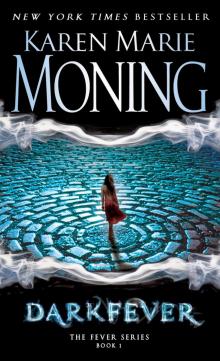 Darkfever
Darkfever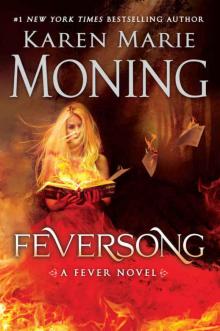 Feversong
Feversong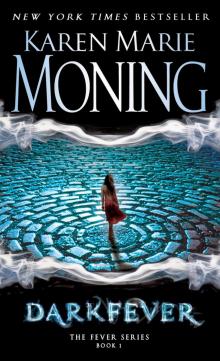 Faefever
Faefever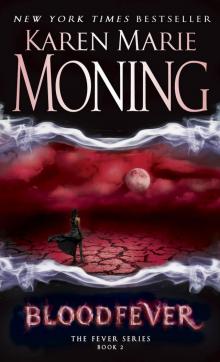 Bloodfever
Bloodfever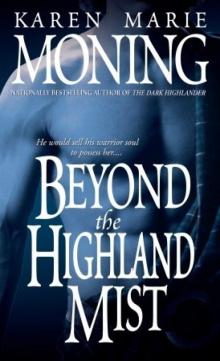 Beyond the Highland Mist
Beyond the Highland Mist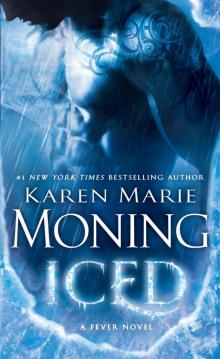 Iced
Iced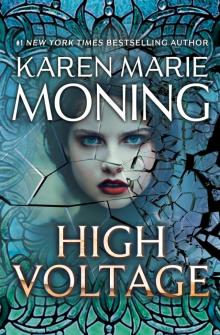 High Voltage
High Voltage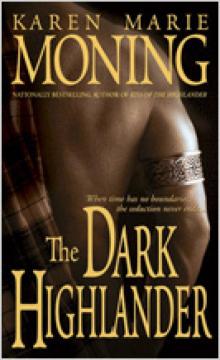 The Dark Highlander
The Dark Highlander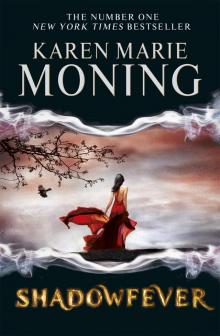 Shadowfever
Shadowfever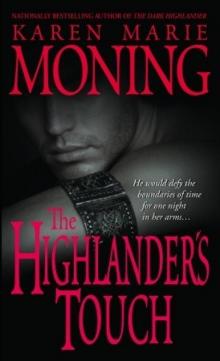 The Highlander's Touch
The Highlander's Touch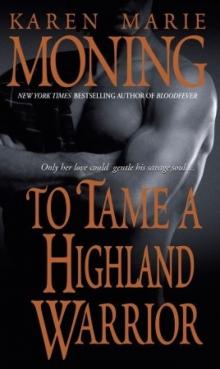 To Tame a Highland Warrior
To Tame a Highland Warrior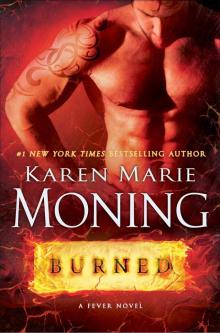 Burned
Burned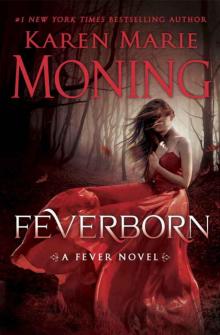 Feverborn
Feverborn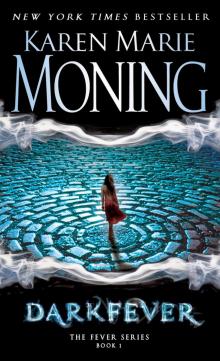 Dreamfever
Dreamfever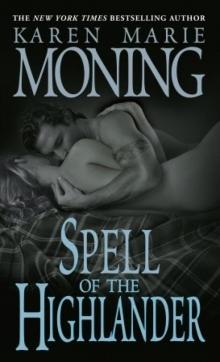 Spell of the Highlander
Spell of the Highlander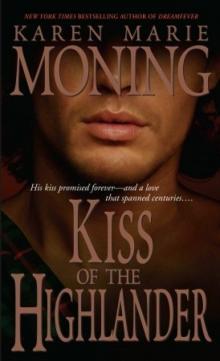 Kiss of the Highlander
Kiss of the Highlander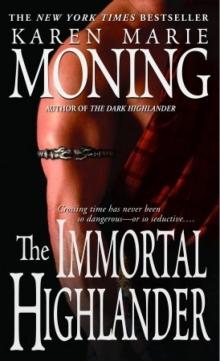 The Immortal Highlander
The Immortal Highlander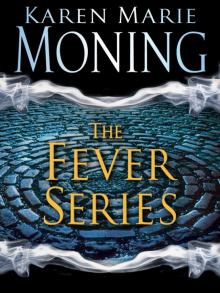 Karen Marie Moning’s Fever Series 5-Book Bundle: Darkfever, Bloodfever, Faefever, Dreamfever, Shadowfever
Karen Marie Moning’s Fever Series 5-Book Bundle: Darkfever, Bloodfever, Faefever, Dreamfever, Shadowfever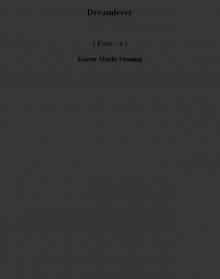 Dreamfever f-4
Dreamfever f-4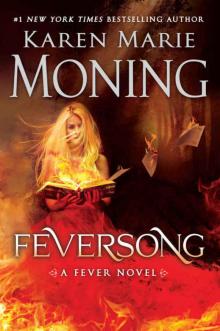 Feversong: A Fever Novel
Feversong: A Fever Novel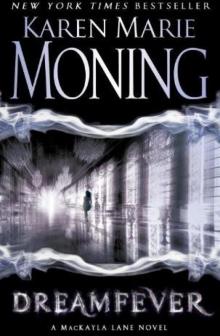 Dreamfever_The Fever Series
Dreamfever_The Fever Series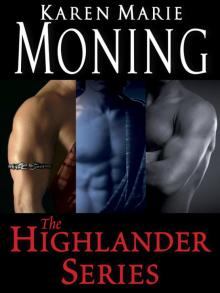 The Highlander Series 7-Book Bundle
The Highlander Series 7-Book Bundle![[Highlander 04] - Kiss of the Highlander Read online](http://i1.bookreadfree.com/i1/03/29/highlander_04_-_kiss_of_the_highlander_preview.jpg) [Highlander 04] - Kiss of the Highlander
[Highlander 04] - Kiss of the Highlander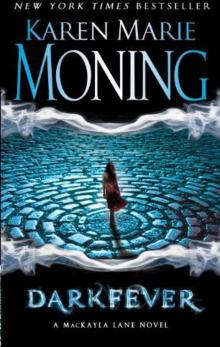 Darkfever_The Fever Series
Darkfever_The Fever Series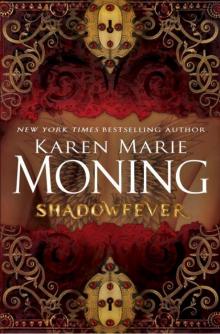 Shadowfever_Fever
Shadowfever_Fever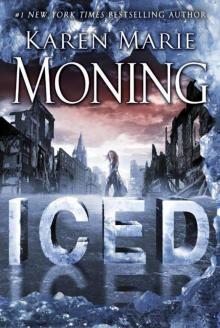 Iced: A Dani O'Malley Novel (Fever Series)
Iced: A Dani O'Malley Novel (Fever Series)![Fever [08] Feverborn Read online](http://i1.bookreadfree.com/i2/04/09/fever_08_feverborn_preview.jpg) Fever [08] Feverborn
Fever [08] Feverborn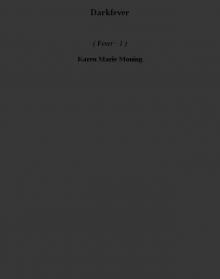 Darkfever f-1
Darkfever f-1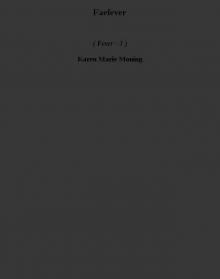 Faefever f-3
Faefever f-3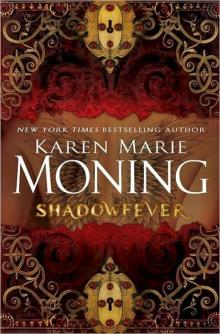 Shadowfever f-5
Shadowfever f-5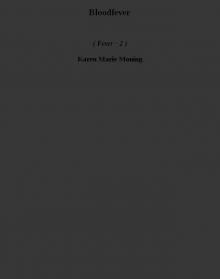 Bloodfever f-2
Bloodfever f-2